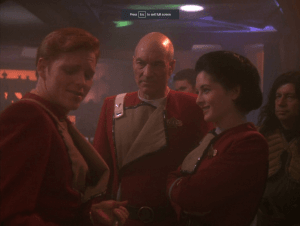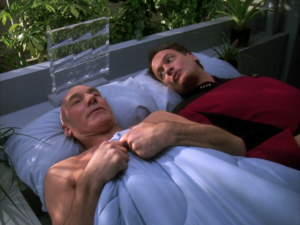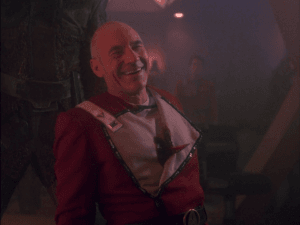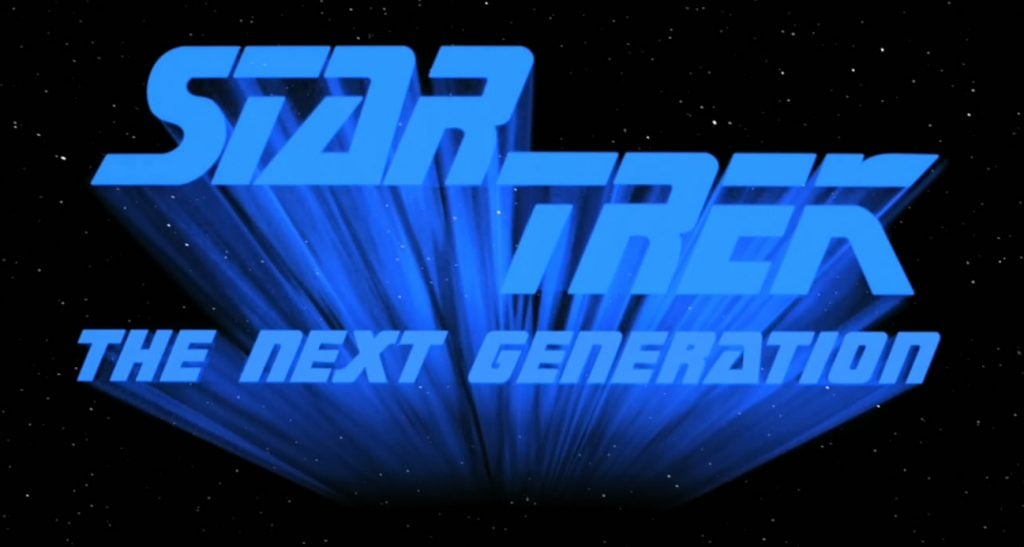Hello and welcome as always to ‘Final Frontier Friday’. Thank you for joining us as we settle in for another ‘Next Generation’ week. Our episode this time out is ‘Tapestry’, from the show’s sixth season.
This is actually the closest we’ve come so far to directly following up (at least in narrative terms) on a an episode we’ve previously covered, as ‘Tapestry’ elaborates on an incident detailed in dialog during ‘Samaritan Snare‘, that being, of course, Picard’s stabbing in a bar fight. ‘Tapestry’ not only allows Picard (and by extension the audience) to relive that event, it also explores the impact it may have had on Picard’s life.
But this wasn’t always the case. When ‘Tapestry’ was first being developed, it was less ‘It’s a Wonderful Life’ and more ‘A Christmas Carol’. Along with the stabbing, the episode at that stage, the episode would have also seen Picard revisit an event from his childhood and an incident from his days commanding the USS Stargazer (depending on who you ask, this may have been intended to detail the circumstances of Jack Crusher’s death). However, this version of the episode never quite gelled to the satisfaction of showrunner Michael Piller. Enter Ronald D. Moore, who in light of Piller’s dissatisfaction refocused the episode so that it dealt exclusively with the stabbing and its consequences. But was it a change for the better? Read on…
 We join the Enterprise in an emergency as sickbay prepares to receive patients. As the wounded are beamed aboard, the most critically wounded turns out to be Picard, whose injuries include damage to his artificial heart. As the camera pushes in on Picard’s prone form from an overhead shot, the picture fades to white and reveals a white-clad Q, welcoming him to the afterlife.
We join the Enterprise in an emergency as sickbay prepares to receive patients. As the wounded are beamed aboard, the most critically wounded turns out to be Picard, whose injuries include damage to his artificial heart. As the camera pushes in on Picard’s prone form from an overhead shot, the picture fades to white and reveals a white-clad Q, welcoming him to the afterlife.
Picard scoffs at this news – insisting that “the universe is not so badly designed” as to place Q in the role of supreme being – and demands to know what is really going on. Q, however, insists that all is as he says before raising the subject of Picard’s artificial heart (which he says is responsible for Picard’s death) before transitioning to the subject of how he came upon it. When Picard dismisses it as a youthful mistake, Q provides a sort of instant replay of the bar fight (between Picard and a trio of Nausicaan thugs) that resulted in his stabbing. Sensing Picard’s regret surrounding the fight, Q offers him a do over, abruptly returning him to Starbase Earhart, some thirty years earlier.
After recovering from his greeting (a slap in the face from a woman his younger self had been two-timing), he reacquaints himself with his friends Cortan “Corey” Zweller and Marta Batanides. The three friends are fresh out of Starfleet Academy and awaiting their first assignments. After his friends leave, Q appears to explain that he is offering Picard the chance to reshape his life, and even assures him that outside of his own life, history will be unaffected. After a date that ends with a drink thrown in his face, Picard catches up to Marta and Corey as the latter is running a dom-jot table. Before long, a certain Nausicaan arrived and challenges Corey to a game.
While Corey plays the Nausicaan, Picard explains to Q that the Nausicaan is cheating, something Corey will realize later that night. The fight, it turns out, was precipitated when Picard helped Corey rig the table ahead of a rematch. For some reason, the Nausicaan and his friends were less that pleased by that. This time, though, Picard plays the voice of reason (or tries to), though Corey doesn’t listen. Picard follows Corey to the bar to once again try to talk him out of it, even threatening to report his tampering to the proprietor. Corey storms off, and the scene changes to Picard sharing his concerns with Marta, who turns out to quite like the “new” Picard. One thing leads to another, and we fast forward to the most awkward morning after of the twenty-fourth century as Picard wakes up next to… Q! After some taunting from Q, Picard vowS that things will be different and meets up with an obviously uncomfortable Marta, who worries about the implications of their dalliance and reminds him of the trio’s plans for a last night out that evening. During that (awkward) outing, the Nausicaans arrive, spoiling for a fight. Picard is able to avoid the fight, but at the cost of having alienated his two best friends.
 He then finds himself in an ersatz present, where he is serving on the Enterprise, but as a junior science officer. After Q explains where he is, Picard goes about an unremarkable day in the unremarkable life he had made for himself. And after speaking with Riker and Troi, he comes to realize just how unimpressive this version of his life has been. No sooner does Picard begin to resign himself to this than Q returns, delivering a scathing speech about the ripple effect that Picard’s early brush with death had on the rest of his life. Picard asks to restore his life, realizing he would rather die as the man he was. Q silently obliges, returning Picard to the bar where the fight proceeds as before, ending with Picard laughing as he is impaled through the heart. Abruptly, we cut to sickbay where Picard regains consciousness, laughing, as Captain of the Enterprise.
He then finds himself in an ersatz present, where he is serving on the Enterprise, but as a junior science officer. After Q explains where he is, Picard goes about an unremarkable day in the unremarkable life he had made for himself. And after speaking with Riker and Troi, he comes to realize just how unimpressive this version of his life has been. No sooner does Picard begin to resign himself to this than Q returns, delivering a scathing speech about the ripple effect that Picard’s early brush with death had on the rest of his life. Picard asks to restore his life, realizing he would rather die as the man he was. Q silently obliges, returning Picard to the bar where the fight proceeds as before, ending with Picard laughing as he is impaled through the heart. Abruptly, we cut to sickbay where Picard regains consciousness, laughing, as Captain of the Enterprise.
To answer the question I posed earlier, the reconceptualization that focused ‘Tapestry’ in on Picard’s stabbing was absolutely the right decision. As interesting as it might have been to see the other incidents and take in the larger scope of his life, the focus on a single event allows the show to really dig in and explore the significance of the event. As Picard himself says at the end, tugging on even the smallest thread can unravel the tapestry of a life, and because of the depth with which the script was able to explore that idea, we ended up with a classic episode.
A good deal of the episode is given over to the back and forth between Picard and Q, which is always a treat to watch. There are any number of reasons for this, not the least of which is the fact that Patrick Stewart and John de Lancie are both terrific actors. But it goes deeper than that, in that when developing the character, de Lancie specifically designed his performance to contrast with what Patrick Stewart was doing as Picard. As the de Lancie himself once put it: “If the person I’m playing opposite is going to be very flamboyant, then I’ll be poopy, and if the person is going to be poopy, then I’ll be flamboyant. That becomes part of the dynamic. If Picard’s position was that he wanted to play, then we would have had different types of scenes.” It’s why, frankly, the character never worked quite as well opposite Sisko and Janeway as he did with Picard.
 But there’s more to ‘Tapestry’ than just excellent performances. It’s also a character study. And not just in the sense that it deals with Picard’s youth. Watching the episode, you begin to notice that most of the changes Picard makes, the things he does differently (the tryst with Marta, for example) are as much attributable to his own regrets and ruminations as they are to Q simply nudging him in a given direction.
But there’s more to ‘Tapestry’ than just excellent performances. It’s also a character study. And not just in the sense that it deals with Picard’s youth. Watching the episode, you begin to notice that most of the changes Picard makes, the things he does differently (the tryst with Marta, for example) are as much attributable to his own regrets and ruminations as they are to Q simply nudging him in a given direction.
Now, if we take the episode at face value and assume that Q really is giving Picard a chance to redo his life, then that could just be Q screwing with Picard. But if we run with the idea that it was all an elaborate hallucination brought on by Picard’s near death experience, that’s when things start to get really interesting. Taking that view, Q essentially becomes the devil on Picard’s shoulder, and the changes Picard makes to his past become less about exploring his regrets and more about revealing his fears. The obvious, of course, is the result of those changes, the idea of being (or becoming) that dreary Lieutenant, “bereft of passion and imagination”. But there’s also everything that happens at Starbase Earhart. Despite his best intentions, he alienates his two best friends. One by trying to help and the other by trying to get closer (as ill advised as it might have been, Picard’s behavior makes clear that his actions with Marta were born of more than base lust). Even something as seemingly small as the date he goes on when he first arrives in the past. He conducts himself with more maturity than his younger self would have, and he gets a drink thrown in his face for the trouble. His life becomes Murphy’s law made manifest. In what way is that not terrifying?
Now, if we take the episode at face value and assume that Q really is giving Picard a chance to redo his life, then that could just be Q screwing with Picard. But if we run with the idea that it was all an elaborate hallucination brought on by Picard’s near death experience, that’s when things start to get really interesting. Taking that view, Q essentially becomes the devil on Picard’s shoulder, and the changes Picard makes to his past become less about exploring his regrets and more about revealing his fears. The obvious, of course, is the result of those changes, the idea of being (or becoming) that dreary Lieutenant, “bereft of passion and imagination”. But there’s also everything that happens at Starbase Earhart. Despite his best intentions, he alienates his two best friends. One by trying to help and the other by trying to get closer (as ill advised as it might have been, Picard’s behavior makes clear that his actions with Marta were born of more than base lust). Even something as seemingly small as the date he goes on when he first arrives in the past. He conducts himself with more maturity than his younger self would have, and he gets a drink thrown in his face for the trouble. His life becomes Murphy’s law made manifest. In what way is that not terrifying?
That’s about it for this installment. What do you think of ‘Tapestry’? Are there any other episodes you’d like to see me cover? Let us know in the comments, and be sure to check back in two weeks when we return to examine our next episode!

